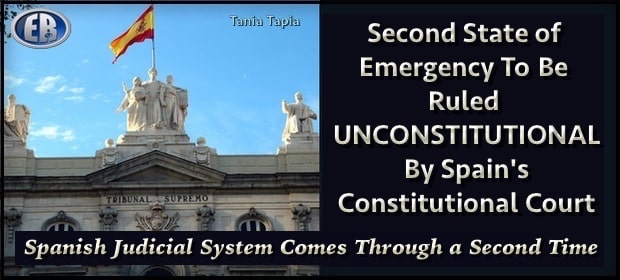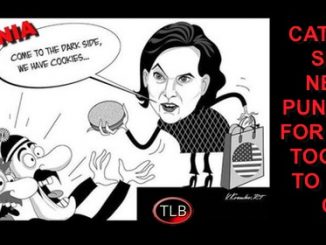
ER Editor: Here are some recent stories we’ve put out on legal rulings in Spain that have gone against the government vis-a-vis the lockdowns and health pass;
- Spain’s Top Court Rules Lockdown Unconstitutional [VIDEO]
- This Gives Hope: “Green Passport” Rejected Throughout Spain
- Spain’s Supreme Court Rules Against Using Vaccine Passports To Restrict Access To Public Spaces
If, however, you look at articles we published before July, it is quite alarming what proposals were being made AGAINST the people: legislation permitting the government to seize people’s property during a health crisis; the Spanish region of Galicia proposing mandatory vaccination of its citizens; and a registry of those who haven’t been vaccinated.
*******
Drama in Spain: the Constitutional Court revolts and declares the state of emergency unconstitutional
CHIEKH DIENG
The Spanish Constitutional Court has declared the second state of emergency unconstitutional. It had been decreed by the socialist Prime Minister, Pedro Sanchez, for facing the second wave of Covid. (ER: Ah, those ‘waves’, which viruses don’t do. A convenient fiction for a new round of unconstitutional actions by our governments.)
Spanish justice, once again, is in the news. If there is a country where the judiciary has given the state authorities a hard time in the management of the health crisis, it is Spain, where several regional courts have recently risen to say no to the Health Pass.
And the judiciary is not yet done defying the central state, which imposed, for a second consecutive time, the state of health emergency on November 3, 2020 throughout the national territory. A measure that is not to the liking of the Spanish Constitutional Court, which declared it unconstitutional.
In any case, this is the information that has reached us from several Spanish sources, including ABC. (ER: We have put this in translation below.) Indeed, according to this media outlet, a complaint filed by the extreme right-wing party VOX has been received by the Spanish justice. In the complaint, the political party led by Santiago Abascal denounces the liberty-destroying measures that constitute an attack on fundamental freedoms taken by regional governments that did not have the authority to do so. VOX also complained that this state of emergency was decided without the opinion of Parliament.
On this point, the media ABC points out that during the second state of emergency, which lasted from November 3 to May 9, the Spanish Parliament was almost closed and during this period, the government did not provide explanations to the people’s deputies. “There were only plenary sessions when Pedro Sanchez, president of the Spanish government, felt like it, in a political strategy that several opposition parties have described as ‘sequestration of Parliament’,” the source pointed out.
Source
************
The second state of emergency was also unconstitutional
ABC
Antonio Narváez, the magistrate rapporteur of what will be the second ruling of the Constitutional Court (TC) on the state of alarm decreed for six months by Pedro Sánchez, has already finalized his resolution, which will once again represent a legal disavowal of the Government for its management of the pandemic.
If in July the TC already ruled that the first imposition of the state of emergency was unconstitutional because its restrictive measures of essential liberties should have been covered by the state of exception, and not by the state of alarm -and therefore were abusive-, in this case the Court will go even further.
Predictably, the TC will now accept two of the three main arguments put forward by Vox in its appeal to denounce the discretionality of some measures of La Moncloa which, according to the first sentence, were arbitrary. Firstly, it will be declared contrary to legality to have decreed an uninterrupted period of exceptionality in Spain for six months without a “real and effective” parliamentary control of the Government, so that the TC will ‘overthrow’ the closure of the Parliament sponsored by Sanchez. And secondly, the so-called ‘co-governance’ will also suffer notable unconstitutional accusations for having unduly attributed to the autonomous communities several restrictive measures of fundamental freedoms that were not theirs to adopt.
The second state of alarm was approved on November 3, 2020 in view of the seriousness of the pandemic, and unlike the previous one, Sanchez decreed it for six uninterrupted months. In contrast to the first state of alarm, imposed on March 14 of the same year, the President of the Government dispensed with the successive extensions that had to be ratified every fifteen days by a sufficient majority in the Congress of Deputies. He did not want to risk losing votes.
No “real and effective” control
Thus, it was prolonged uninterruptedly until May 9, 2021, when it lapsed. But in that period, the Parliament remained practically closed, and the legal provisions for the Government to submit, for example, to control sessions, were not complied with without sufficient legal justification. There was only parliamentary activity as and when Pedro Sánchez wanted, in a political strategy that several opposition parties labeled as “hijacking of the Parliament”.
In this paper, the TC will now rule that the occasional appearances made by Sánchez in Congress, or those he delegated to the then Minister of Health, Salvador Illa, and later to Carolina Darias, were not enough to comply with the requirement of oversight of government action during an exceptional period, such as such a long state of emergency.
Mass confinements
Those appearances did not meet the minimum requirements for the real and effective control of the Executive that legality demands in a State under the rule of law, and there was no proportionality between the seriousness of an emergency decreed for half a year and the parliamentary accountability of the President of the Government and his ministers. Furthermore, and in political, not legal terms, Sánchez did not even keep his word to appear before the public on the dates and in the terms to which he had initially committed himself.
Also new is the legal analysis to be made by the rapporteur on the scope of the ‘co-governance’ decreed by the Government. Thus, the TC plans to consider unconstitutional the indiscriminate delegation to the communities of measures restricting freedoms -mass confinements, closures, or even curfews-, because they lack the powers to do so in our legal system. At least, in the coercive terms in which some communities adopted them.
In fact, in recent months, there have already been numerous rulings by different High Courts of Justice -and at least one by the Supreme Court- highly critical of ‘co-governance’ and the lack of legal anchorage to limit freedoms by mere delegation or authorization of the Government. In short, the argument of the rapporteur of the TC will be based on the fact that the indiscriminate delegation to regional governments of powers affecting fundamental rights is an openly unconstitutional disempowerment of the State.
Vox has not won in everything
On the other hand, however, the TC plans to dismiss one of the arguments put forward by Vox in its second appeal against the state of emergency. Just as with the March 2020 lockdown, the Court considered that the restrictions were not a mere limitation of freedoms, but an illegal “suspension” that would only have been legally justified under a state of emergency, now the TC assumes that the second state of alarm was not as drastic as the first. In fact, with what Sanchez called the “new normality” in place, there was no longer a ban or an absolute suspension of movements, as was the case previously, but a catalogue of more relaxed restrictions, which would have been justified under the law. In this, the TC does not agree with Vox.
Similar majority of votes
According to what ABC has been able to learn from sources in the Court, and in the absence of the debate in the Plenary, Judge Narváez counts on having a sufficient majority of magistrates to move forward with his report in the coming weeks. In the case of the first sentence, the vote – held in July in such a convulsive and rarefied atmosphere that it caused a severe crisis in the Court – was six judges against five. The division did not prevent them from finally ‘overturning’ the essential part of the state of alarm. In that vote it became clear that the supposed ‘logic of blocks’ or of magistrates obedient to the parties that appointed them ceased to function in the TC some time ago. In fact, the fracture already exceeds the mere ideological division between conservatives and progressives, and the breakdown of internal confidence among some judges already seems irreversible.
Source
************

••••
The Liberty Beacon Project is now expanding at a near exponential rate, and for this we are grateful and excited! But we must also be practical. For 7 years we have not asked for any donations, and have built this project with our own funds as we grew. We are now experiencing ever increasing growing pains due to the large number of websites and projects we represent. So we have just installed donation buttons on our websites and ask that you consider this when you visit them. Nothing is too small. We thank you for all your support and your considerations … (TLB)
••••
Comment Policy: As a privately owned web site, we reserve the right to remove comments that contain spam, advertising, vulgarity, threats of violence, racism, or personal/abusive attacks on other users. This also applies to trolling, the use of more than one alias, or just intentional mischief. Enforcement of this policy is at the discretion of this websites administrators. Repeat offenders may be blocked or permanently banned without prior warning.
••••
Disclaimer: TLB websites contain copyrighted material the use of which has not always been specifically authorized by the copyright owner. We are making such material available to our readers under the provisions of “fair use” in an effort to advance a better understanding of political, health, economic and social issues. The material on this site is distributed without profit to those who have expressed a prior interest in receiving it for research and educational purposes. If you wish to use copyrighted material for purposes other than “fair use” you must request permission from the copyright owner.
••••
Disclaimer: The information and opinions shared are for informational purposes only including, but not limited to, text, graphics, images and other material are not intended as medical advice or instruction. Nothing mentioned is intended to be a substitute for professional medical advice, diagnosis or treatment.




